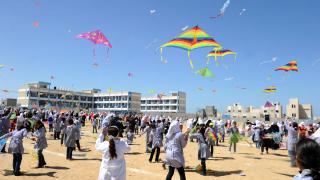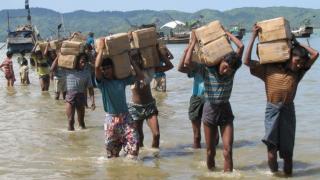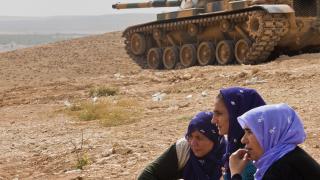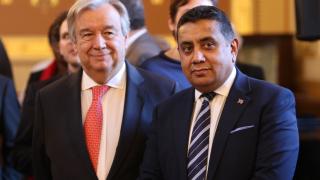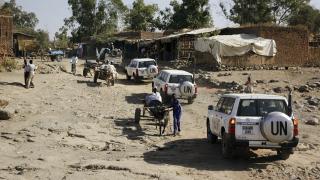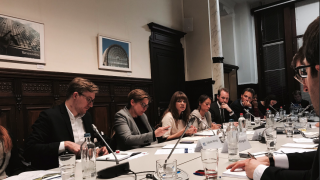UNA-UK’s Laurel Hart joined state representatives, UN officials, NGOs and academics in Entebbe, Uganda last week to discuss atrocity prevention strategies and to find ways to strengthen mechanisms to prevent atrocities.
The meeting convened over 200 leading practitioners in the field of atrocity prevention to share their best practices and propose solutions to challenges facing their work. Delegates had the opportunity to attend thematic workshops and develop new and innovative ideas to prevent atrocities.
Day 1
The Global Action Against Mass Atrocity Crimes' (GAAMAC) third meeting opened with keynote speeches from UN officials, state and NGO representatives. Mr Adama Dieng, the UN's Special Advisor on genocide prevention highlighted the current worrying trend of atrocity crimes: "since 2005, when all states endorsed their responsibility to protect (R2P) their populations from atrocity crimes, the number of armed conflicts has increased threefold, and the number of civilian casualties nine-fold". He went on to highlight the situation in Myanmar as an illustration of the international community's inaction, having "buried its head in the sand" despite numerous warning signs. He also pointed to Syria as a case of "abject failure in our collective responsibility to prevent and protect."
Joining via video link UN Secretary-General António Guterres welcomed the timely meeting as a "critical space to learn from each other". He called on delegates to pledge to: "step up to protect the vulnerable, speak out against intolerance and hate, and stand up for human rights, our shared values and our common humanity".
Keynote speakers and delegates went on to discuss the impact of success of prevention and the consequences of failure. In his remarks, Mr Ivan Simonovic (former UN Special Advisor on R2P) pointed to the positive developments in R2P, highlighting the adoption of R2P on the UN General Assembly's formal agenda as an opportunity for states to reaffirm their commitment to R2P and atrocity prevention. Mr Simonovic went on to defend the concept of R2P, arguing that it has not failed but "we have failed to implement it".
Mr Simonovic called on Mr Guterres to place atrocity prevention at the heart of his prevention strategy. Commenting on the role of the UN Security Council, Mr Simonovic highlighted the lack of consensus among member states to provide meaningful responses, pointing to the recent decision to intervene in Syria as an intervention that, as with actions in Kosovo in 1999, some argued "was not legal but legitimate". Click here for UNA-UK's statement on this. He went on to highlight the need for the UN Security Council to "do more" at a time when it has never been more "divided and paralysed".
Delegates then split into thematic workshops on "engineering prevention: learning from other prevention systems". UNA-UK's representative attended a workshop on the "prevention of armed violence" which discussed the importance of relationships as a key foundation for prevention alongside mechanical structural intervention (including military intervention and the rule of law) as approaches to consider when dealing with armed violence.
Day 2
Day 2 was an opportunity to look at prevention in action and share expertise, learning and good practice. The day commenced with a presentation from the African Working Group on its draft manual on the establishment and management of national mechanisms for genocide and mass atrocity prevention.
Delegates then reflected on the conditions, prerequisites and good practices in the establishment of national architectures for the prevention of atrocities. Our representative participated in the following workshops: "the role of national institutions in atrocity prevention" and "the protection of civilians (PoC) and atrocity prevention".
On the role of national institutions (parliaments and national human rights institutions), delegates highlighted the critical importance of human rights institutions as tools in atrocity prevention and the need for human rights to be institutionalised across all sectors including: the security sector, the media, religious organisations and CSOs.
The "protection of civilians and atrocity prevention" workshop looked at the role of PoC and R2P as a tool of prevention. Delegates discussed the value of applying an atrocity prevention lens in order to better protect civilians, especially in cases where the host government is complicit or party to the perpetration of mass atrocities.
Our representative highlighted the importance of proper implementation of PoC in UN peacekeeping mandates, and called for the need to reform UN peacekeeping with regards to cases of sexual exploitation and abuse by UN peacekeepers. UNA-UK also raised the importance of women’s participation in the prevention of conflict and mass atrocities and pointed to peacekeeping as an area where women can successfully contribute to the responsibility to protect.
Day 3
The final day was used as a platform for building partnerships and working to develop innovative prevention initiatives which could serve the global atrocity prevention community in the future. Delegates were organised into regional groups to generate ideas to be chosen and implemented and its result to be presented during the next conference: GAAMAC IV. The meeting drew to a close with presentation of the outcome document of GAAMAC III.
UNA-UK attended GAAMAC as a member of the International Coalition for the Responsibility to Protect (ICRtoP) steering committee alongside other NGOs working on atrocity prevention.
Click here for more on UNA-UK's atrocity prevention work and for UNA-UK's recent call for the UK government to prioritise atrocity prevention.
Photo: GAAMAC III

